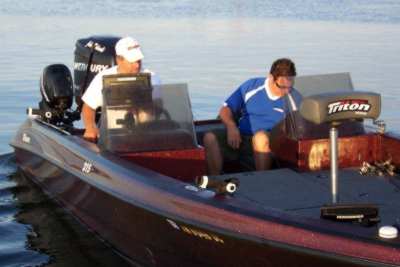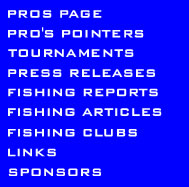Competitive fishing is about adapting
to changes in conditions, interpreting cause-and-effect
relationships and anticipating what will happen on a given
day.
Anglers who do the best job of analyzing and acting upon
the data available to them are usually the last ones standing
on the big stage at the end of a tournament or the end
of a season.
The same can be said of our sport in general. While our
sport has certainly felt the bite of a tough economy in
terms of participation and sponsorship, it has also grown
because of those challenges.
Contrary to popular belief, the future of competitive
walleye fishing has never been brighter.
As exhibit A, I offer the new Anglers Insight Marketing
(AIM) walleye fishing circuit. It's not the local fishing
derby our grandpappy knew.
AIM is the product of a handful of professional walleye
fishing's brightest minds, who recognized the shortcomings
of other circuits and addressed them with a sound business
strategy and techno-savvy execution.
It isn't a takeoff of the old Professional Walleye Trail.
It's an entirely new approach to tournament fishing. It's
owned by its anglers and supported by its sponsors, not
the other way around.
AIM is angler-friendly yet environmentally responsible,
and that's one of the biggest reasons it has attracted
interest from other tournament fishing organizations.
 |
When AIM's anglers catch a fish, it
is recorded and released within minutes. No 50-mile
boat rides in a crowded livewell with two or three
stops to refresh the fish. No frisky, slippery walleyes
squirting from an angler's hands onto a concrete
floor. No washed-out, nearly lifeless lunkers being
toted from the boat to the weigh-in stage, held
up for pictures, and then tossed into a cooler to
eventually become fillets for the local food bank
or assisted-care facility. |
In other words, AIM is committed to protecting the resource,
not abusing it. As a result, it can acquire permits to
fish nearly anywhere any time of the year, and more communities
are receptive to hosting a circuit that doesn't threaten
its fishery.
From an angler's standpoint, AIM increases my fishing
time. When fish were kept and weighed, there were days
when I had my limit by 9 a.m. and had to stop fishing
as per state and tournament regulations and spend the
rest of the day tied up to the dock, sitting in the boat
and waiting for the weigh-in. It's hard on the fish and
hard on the anglers.
Now, everyone is on a level playing field and luck doesn't
factor into the outcome nearly as much as it might in
a slot tournament.
Because no fish are kept, rules regarding the culling
of fish don't apply. Whomever catches the largest fish
wins. I remember so many days on bodies of water with
a slot limit where I had to make a decision early in the
day whether to keep a 17-inch walleye or throw it back.
Too often, I made the wrong decision and regretted it
later. I've also had too many days where every walleye
I caught seemed to fall within the protected slot, while
another angler got two or three of the "right"
bites and finished better without actually outfishing
me.
Now, each fish is recorded on camera and paper as soon
as it's caught. It's photographed on an AIM-assigned bump
board, photographed with either the pro or co-angler holding
it, then released. At the end of the day, your seven largest
fish make up your weight.
I feel like I'm a better host for my co-angler. With an
empty livewell, there's more room for food and refreshments.
With no need to fret over travel time, fish care and catching
the right fish in the right order, there's a lot less
stress involved. However, my heart did nearly stop during
my first AIM tournament when I went back to the livewell
to check my fish and there weren't any there.
Many people expressed concerns about the format of AIM
weigh-ins. With no fish, how would they pull off an entertaining
and dramatic show? With the technology AIM has employed,
weigh-ins are actually more compelling than ever.
When we get to the dock, we hand over our cameras and
memory cards, which are then quickly processed by AIM
staff into a brief video that shows on the big screen
behind us as we are interviewed by the emcee. We can get
a little extra face time for ourselves and our sponsors
by shooting our own video during the day.
For those who survive the cut to fish the final day of
a tournament, web cams and tracking devices add a real-time
dimension to everything. Fans can log on to the AIM web
site (www.aimfishing.com) and watch where each angler
goes during the day and what he or she catches. At the
weigh-in, all that video and data is edited and packaged
for the big screen.
Co-anglers under the AIM umbrella aren't competing for
big bucks. They pay $250 to fish two or three days with
the pros, and the co-angler whose team catches one fish
has the same chance to win a major prize as one who catches
seven fish. It seems like it's made co-anglers who would
have previously been fishing for big prize packages less
inclined to break the rules by telling their pros where
they were or what they did with other pros on previous
days.
Beyond the world of AIM, there are other signs that walleye
fishing is alive and well.
Major manufacturers like Triton and Mercury are certainly
feeling the pinch as consumers delay decisions to make
big purchases, but people still need bait, tackle and
accessories.
Some circuits have reduced entry fees. Most have taken
steps to reduce the travel required by anglers. In some
cases, anglers feeling the financial pinch have changed
to less expensive, less demanding circuits to stay in
the competitive game. Some pros who previously made their
living entirely within the fishing industry are taking
on parttime work to bridge the income gap.
Eventually, the economy will rebound. Tournament fishing
will come back stronger than ever. And those in the walleye
game will be leading the charge.



